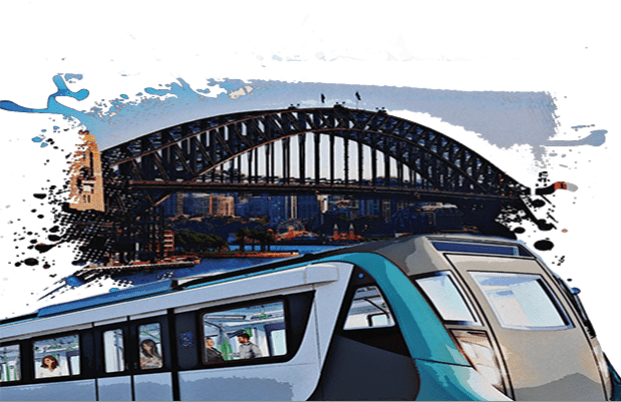Sydney’s train system is failing. Frequent delays are felt across the network due to systemic issues including inadequate backup power generators, shortened crew handover times, slow issue response and an inflexible new timetable.
In June 2015, the NSW Government announced plans for a revolutionary driverless rail network—the Sydney Metro. The project is now underway, and the announced routes in Sydney’s northwest, CBD, west and southwest are scheduled to be completed by 2030. There are 33 confirmed stations to be created or converted to the Metro system, spanning over 66 kilometres. The first stage of the project, the northwest line through Chatswood, is scheduled to be operational by later this year. We are being promised peak hour services every 4 minutes, and platform screen doors to improve safety and decrease incident-related delays. —
There are still many hurdles to clear before these benefits may be enjoyed. For many years to come, expanding construction will bludgeon day-to-day operations, putting the Sydney Trains network under immense pressure. This will in turn increase demand for alternative public transport services— buses, ferries and the light rail. Unreliable public transport will prompt many to drive to school or work, congesting our already busy roads and making the bus an even worse solution for those with no access to a car.
Major delays within Sydney’s public transport system are not hypothetical. On January 9, 2019, the city experienced some of the worst delays in decades, with only a quarter of the scheduled afternoon train services arriving on time.
Given the centrality of public transport in most people’s lives, the Metro network has become a highly political issue that voters are increasingly willing to prioritise. Voters are clearly exasperated with the current system, especially compared to more efficient systems in cities like Melbourne and Brisbane, which outrank Sydney in almost every aspect of public transport infrastructure. The Light Rail construction has seen both major parties blame the other for delayed project timelines and mismanaged funding allocation. Labor recently pledged $8 billion to ‘fast-track’ the project. An already optimistic timeline raises questions as to how they will be successful should they win the next State election in March.
Beyond infuriating construction-delays, the Metro Rail project itself has fundamental flaws. Original plans were rushed through Parliament, hastily adjusted by politicians with very little knowledge of transport engineering. The system’s heavily expedited plans give us little hope for the saving grace we were promised.
For one, the Metro was initially designed for high capacity, short distance transport (such as around the CBD). Carriages on longer lines, like the northwest, will likely fill up at the first few stations. The potential for congestion-induced delays skipped stations is high, leaving us once again with an inadequate transport system.
While Sydney’s Metro falls to political whims, students are left wanting. Students typically have very little disposable income and tend to be time-poor. For those financially privileged who own a car in order to transit to class and work, loan and petrol payments further strain weekly budgets. Unreliable public transport inevitably means students have less available hours in the day for study or idle time, only degrading their social wellbeing and mental health.
Wasting away on train platforms and standing on packed trains are barely soul-nourishing experiences. These woes are compounded for international students — expected to manage unreliable transit whilst paying exorbitant tuition fees and barred from concession Opal cards — only further straining their work-life balance.
It’s clear that politicians like Premier Gladys Berejiklian and NSW Labor Leader Michael Daley have prioritised a short-term solution that ensures votes, rather than investing in long-term infrastructure improvements. If future policies continue to take this approach, Sydney’s public transport will always be behind schedule, a never-ending loop of problems and quick fixes.





